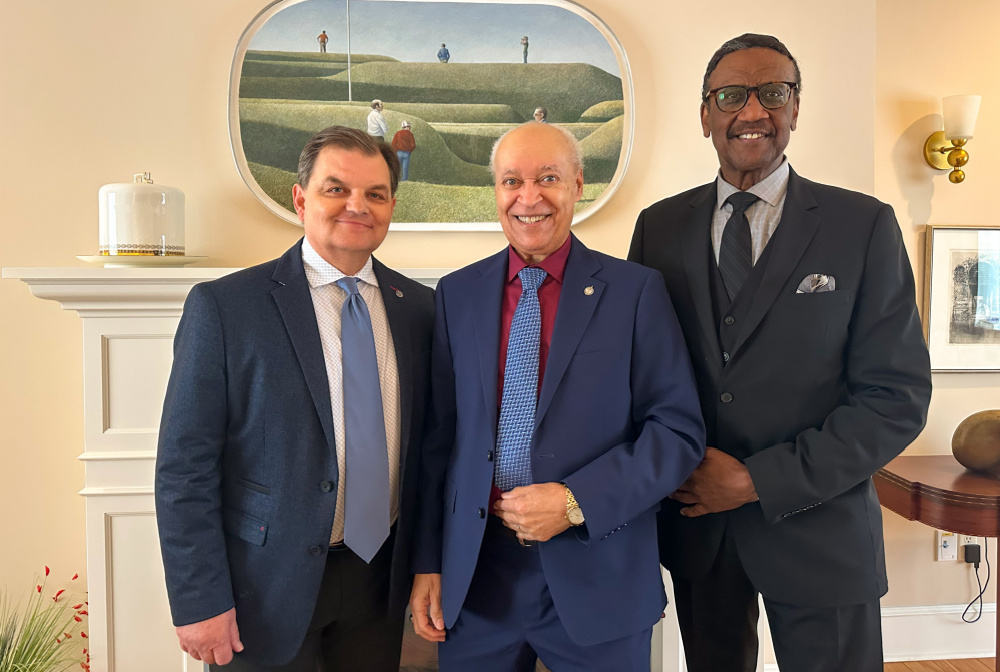
L – R: President William Lahey, Dr. Gordon Sinclair Earle BA’63, DCL’22, Board of Governors Chair Douglas Ruck, KC
An academic entrance scholarship offered by the University of King’s College to African Nova Scotians has been renamed the Gordon Earle Scholarship, after Dr. Gordon Sinclair Earle, BA’63, DCL’22. Dr. Earle was the first recipient of the scholarship, originally called the Prince Scholarship after the pioneering sociologist, Anglican priest and King’s professor Dr. Samuel L. Prince, when it was first established in 1959. At the time, it was the only scholarship dedicated to African Nova Scotian students offered by any university in the province. After being discontinued in the 1970s, it was reinstated by King’s in 2018. Today the scholarship is valued at six thousand dollars a year, renewable for four years.
President William Lahey said the time had come for the scholarship to take the name of an African Nova Scotian. “Dr. Earle is not only the first and distinguished recipient of this scholarship—his life and trailblazing career stand as a shining example to all current and future Gordon Earle Scholars.
“The original namesake of this award, Dr. Samuel Prince, was a very humble, selfless person who never sought the limelight for himself. [Board Chair] Doug Ruck and I are sure that if Dr. Samuel Prince were here to be asked, he would agree that the time has come to rename his scholarship after an African Nova Scotian.”
A leader from a young age, Dr. Earle’s life is replete with firsts. In addition to being the scholarship’s inaugural recipient, he was one of King’s first African Nova Scotian students. Later, as Nova Scotia’s chief human rights officer, Dr. Earle drafted Nova Scotia’s first Human Rights Act. When, in 1982 he was appointed ombudsman for Manitoba, he became Canada’s first African Canadian ombudsman. Upon his return to Nova Scotia, Dr. Earle was appointed to the position of deputy minister of housing and consumer affairs, making him the first deputy minister of African descent in the history of Nova Scotia’s civil service. He subsequently became the first African Nova Scotian to sit in the House of Commons, elected as the Member of Parliament for Halifax West for the New Democratic Party.
A deep commitment to social justice forms the throughline of Dr. Earle’s personal and professional occupations. He successfully advocated for a public inquiry into abuse at the Nova Scotia Home for Colored Children and he was one of the first to call upon the federal government to apologize for the racist treatment of No. 2 Construction Battalion members during and following their service in the First World War. An apology was finally delivered by the federal government in July of 2022. That same year, he was awarded an honorary Doctor of Civil Law (honoris causa) at King’s 232nd Encaenia.
Dr. Earle said he accepts the naming of the scholarship in his honour, “with pride and humility.”
“My parents, Katherine and Maurice Earle, were kind and loving people who consistently emphasized to me, and my two brothers, the importance of obtaining a good education, an education that would go beyond reading, writing, and arithmetic, and would lead to encompass knowledge, wisdom, respect, and love for others. I can remember my father saying that we should always love and respect other people and never let anyone take away our good name and both he and my mother were always living examples of that.
“I, and my brothers learned from our parents and elders in our communities, many lessons of life which enabled us to move through the rough times and see the silver lining behind the clouds of life.”
As a signatory institution of the Scarborough Charter on Anti-Black Racism and Black Inclusion in Canadian Higher Education, King’s has committed to becoming “a university where Black students, faculty and staff can flourish.” As part of this work, in June of 2023 the university signed a memorandum of understanding (MOU) with the PREP Academy of Dartmouth, N.S., to promote access, success and retention of African Nova Scotian students at King’s.
Chair of King’s Board of Governors Douglas Ruck, KC, described the scholarship’s significance to this work and the impact of naming it after Dr. Earle.
“Scholarships that attract and help retain students from racialized and marginalized communities are a tangible acknowledgment that members of these communities were (and are) disadvantaged in accessing educational opportunities and are, consequently, underrepresented in many post-secondary institutions.
“Equally significant is having a scholarship that honours and is named after a prominent and highly respected African Nova Scotian community member. Dr. Gordon Earle is an individual who, in his professional and personal life, has consistently demonstrated a commitment to education and social justice. He has led by example and inspired by his words and actions. Through this scholarship that bears his name, he will continue to make a difference in the lives of individuals, the African Nova Scotian community and the King’s community.”
For Dr. Earle, the scholarship brings with it an important message.
“While the intent of the scholarship is to assist Nova Scotians of Black heritage achieve their educational goals, I would respectfully suggest that it goes much deeper than simply supporting the financial needs of the student, and extends to providing a sense of caring and support for the student as a whole. This scholarship will signal to its recipients that we care for you, we love you, and we will work together with you, as we build a better world—a world where no one is left behind.”

